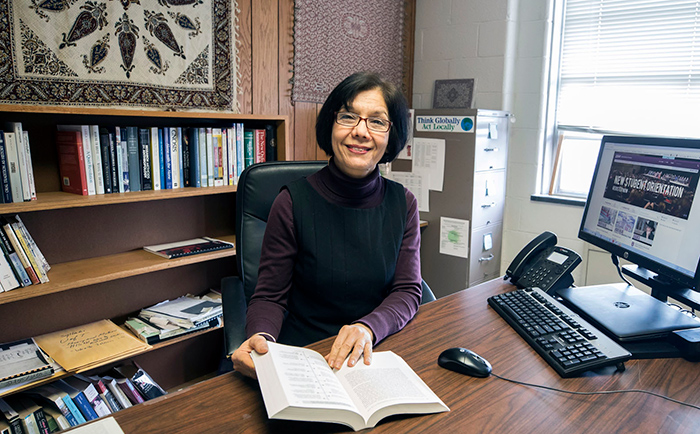
RICHMOND, Ky. (March 9, 2018) – On the first day of any of her classes at Eastern Kentucky University, history professor Dr. Mina Yazdani asks each of her students the same question: “If there’s one thing you want the class to know about you, what it would be?”
It’s her way of forging “human connections” and demonstrating that each individual is “unique.”
Certainly, Yazdani’s life story is unique, one filled with promise, heartbreak, resilience and, ultimately, success and happiness in a rather unlikely setting.
It all started in Iran, where she grew up in a loving and supportive family that valued education as a central tenet of its Bahá’í faith, especially for females. The Islamic Revolution of 1979 was still a few years away and, though physical retribution was not a concern at the time, members of the Bahá’í Faith, the largest non-Muslim minority in the nation, often faced subtle and not-so-subtle forms of persecution and/or discrimination.
An older sister had longed to be a nurse but was turned away after she put “Bahá’í” on an employment application. “That shaped me,” Yazdani said. “It was my first experience of injustice in life, and it’s why I became so conscious about discrimination.”
Yazdani yearned to become a doctor and cites her acceptance into medical school as one of the happiest occasions of her life. For anyone in Iran wanting to be a physician, seven years in medical school immediately followed high school. By the time Yazdani was completing her fourth year at the Shiraz University, it was clear that the Shia clerics were now in charge, following the 1979 revolution.
In April 1980, universities were closed as part of the “Cultural Revolution” for what was initially an unknown period of time. For more than a year in this interim period, Yazdani received permission from several medical school professors to accompany them in their hospital rounds, “just for the mere learning.”
When the medical school re-opened in late October 1981, Yazdani tried to re-register as required but was told, “Your name is not on the list. You are not allowed to re-enter the university. You are dismissed!” When she asked why, a terse, not-so-cryptic response came back. It was her “membership in the misguided sect.” She knew then that the denial of Bahá’ís from higher education was the policy of the revolutionary regime.
Despite the setback, Yazdani refused to give up on her dream, her faith, or, for that matter, her country.
“I stayed because I had the feeling that if all those who could leave, left the country, what would happen to those who couldn’t? I was torn by my love for medicine and my dedication to my religion. It intensified my faith.”
Thirsty for knowledge and flush with a desire to help others, members of the Bahá’í community established their own network of education – “constructive resilience,” as it has been called. Yazdani was an active participant, often serving as a mentor.
Another door of opportunity soon opened: a bachelor’s of general studies degree with a concentration in social and behavioral sciences via correspondence with Indiana University. She likened the experience to spotting a small hole in a wall and putting your nose in to breathe the fresh air outside.
By 1998, during the administration of reformist cleric Mohammad Khatami, Bahá’ís were granted the opportunity to obtain passports. Yazdani sought and was awarded a scholarship to study spiritual psychology at Landegg University in Switzerland.
Her love of learning then took her to a master’s degree program in religion and culture at Wilfred Laurier University in Canada and then on to a doctoral program at the University of Toronto, where she earned her doctorate in Middle Eastern and Islamic Studies. She joined the EKU history faculty in 2011.
When she’s not teaching about Middle East history and culture and making those “human connections” with her students, her mind at times wanders back to Iran, where many friends and several family members remain.
“Sometimes I close my eyes and imagine myself in Shiraz,” Yazdani said. “Even though Richmond, Kentucky, is my home, I think about going back and I become very emotional. Sometimes I miss just walking down the streets, smelling the blossoms, especially this time of year. But that’s true for everyone who leaves their motherland.”
Yazdani, who has lived in four countries, considers herself a “citizen of the world,” adding that she sees her EKU students “in the same light as the youth she taught in Iran.”
Despite having her childhood dream dashed, Yazdani harbors no ill will for the Iranian people. She takes advantage of every opportunity at EKU and elsewhere to shatter misperceptions others may harbor about the Middle East nation.
“It’s a very diverse country, ethnically and religiously,” she explained. “The majority of Iranians are hospitable, loving people, very interested in people from other countries. Most of my Muslim friends fully embrace diversity. The general population is becoming more aware of who Bahá’ís really are.”
Yazdani, who has begun work on her second book, may never return to Iran, but mementoes dot her EKU office, including two large Iranian tapestries on the wall behind her desk and a piece of art work on a shelf directly in front of her that she said reminds her that “we are all one.”




















Add Comment